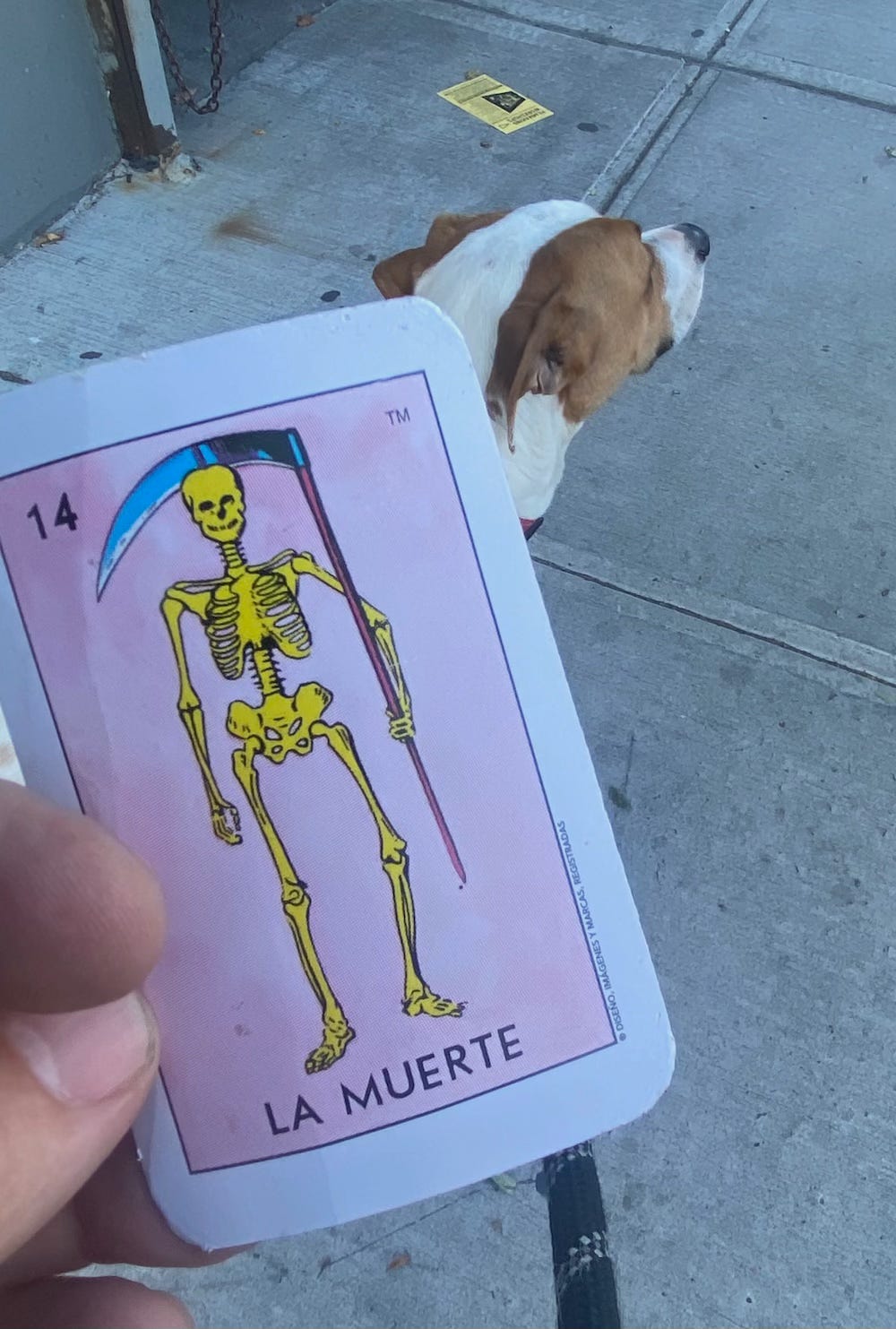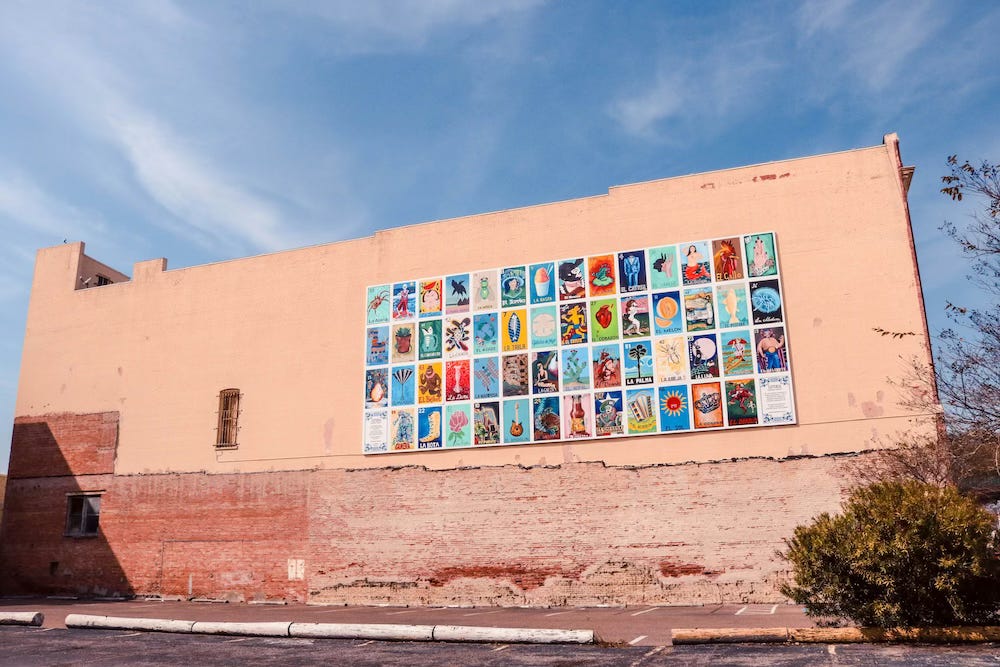Vlad and I found the tarot card together on one of our afternoon walks.
Most people probably would have found it unsettling, even frightening, to stumble upon it.
As an oracle card veteran––I’ve shared that I draw from many different decks every morning to guide my day––I knew that, despite the name, its deeper meaning is about transformation and rebirth.
Even so, you can’t help but react when you suddenly encounter the Death card on your path.

Writing about that card, one of my favorite tarot commentators shares that:
“You are letting go of what no longer serves, what you no
longer require on your journey.
Moving into the unknown can be scary,
but holding tight to what you have is far more frightening.
You are moving in a direction of your highest good.”
Since the theme I’m exploring this month is Embracing the Unknown (Meditation HERE), it seemed particularly fitting.
Ironically, even when we know something no longer serves us, it’s often the letting-go part that’s the most difficult.

This week I recalled a dinner with someone from a lifetime ago.
Every few years, they cross my mind, and it’s quite easy and fun to google their stratospheric success in the world of finance.
That night decades ago, they introduced me to the Monty Hall Paradox, a famous probability puzzle named after the classic game show Let’s Make a Deal.
Here’s the setup:
- You’re a contestant on Monty’s game show, and three doors stand in front of you.
- Behind one door is a car (the prize you want to win). Behind the other two doors are goats (why goats? I have no idea).
- You make your choice, obviously hoping for the car.
- The host, Monty Hall (who knows what’s behind each door), opens one of the remaining two doors, revealing a goat.
Your New Dilemma:
Do you stick with your original choice, or switch to the other door to maximize your chances of winning the car––and does it even matter?

When it comes to vices, one finds many endorsements for Embracing the Unknown.
Mae West famously quipped:
“When choosing between two evils,
I always like to try the one I’ve never tried before.”
Or take the Sondheim lyrics sung by the Madame in The Seven-Percent-Solution:
“Once, yes, once is a lark.
Twice, though, loses the spark.
Once, yes, once is delicious,
But twice would be vicious,
Or just repetitious.
I never do anything twice.”
Most people, including myself, when presented with the Monty Hall Paradox, don’t believe they should switch their choice.
After all, besides practicing the virtue of loyalty, it seems intuitive that the odds are 50/50 for the car being behind either remaining door.
Fascinatingly, though… we’re wrong.
Switching dramatically increases your odds of winning.

Speaking of paradoxes, the Write Anyway Summit that I’m part of is focused on how we can––in fact, must––continue our creative journey despite challenging circumstances.
That and the name “Write Anyway” helped me remember a well-known poem.
It’s often misattributed to Mother Teresa because it was displayed on the wall of one of her children’s homes, since she was apparently inspired by its message.
Kent M. Keith actually wrote the poem in 1968 while a 19-year-old Harvardsophomore.
Here it is:
The Paradoxical Commandments
”People are illogical, unreasonable, and self-centered.
Love them anyway.
If you do good, people will accuse you of selfish ulterior motives.
Do good anyway.
If you are successful, you will win false friends and true enemies.
Succeed anyway.
The good you do today will be forgotten tomorrow.
Do good anyway.
Honesty and frankness make you vulnerable.
Be honest and frank anyway.
The biggest men and women with the biggest ideas can be shot down by the smallest men and women with the smallest minds.
Think big anyway.
People favor underdogs but follow only top dogs.
Fight for a few underdogs anyway.
What you spend years building may be destroyed overnight.
Build anyway.
People really need help but may attack you if you do help them.
Help people anyway.
Give the world the best you have and you’ll get kicked in the teeth.
Give the world the best you have anyway.”
I can’t think of a stronger encapsulation of the Write Anyway Summit’s message to persist through life’s challenges than these lines.

Back to Monty Hall and the goats…
The math is actually quite counterintuitive.
Here’s the breakdown:
- When you make your initial choice, there is a 1/3 chance that you picked the car and thus a 2/3 chance that you picked a goat.
- After Monty reveals a goat, in reality your original odds haven’t changed: there’s still a 1/3 chance you picked the car, and a 2/3 chance it’s behind the other unopened door.
What does this mean?
If you stay with your original choice, the odds remain the same: 1/3.
However if you switch––the Optimal Strategy––because Monty has eliminated one goat, your chances of winning increase to 2/3
Therefore, if you care about the prize, you should always switch, despite what your knee-jerk response tells you.
In other words, if you want to get what you want, even if it doesn’t fully make sense, you must embrace the unknown.

If your mind is still rebelling against this, you’re not alone.
In fact, when the paradox was featured in the column of Marilyn vos Savant––who had the highest IQ ever recorded––in Parade magazine in 1990, it ignited a flood of protest.
Thousands of letters argued that she was wrong, included many complaints from mathematicians and academics.
Over time, computer simulations clearly demonstrated that switching leads to winning two-thirds of the time, and nearly every skeptic has accepted this wisdom.
Or, as Joseph Nguyen writes in his wonderfully wise book Don’t Believe Everything You Think:
“The unknown is the only way to manifest
what you want in life if you don’t already have it.”
If you want to join us for the first book club meeting where we’ll be discussing this and his book––or just support this newsletter if what I’m sharing resonates––you can sign up HERE.
Transformation Book Club (& More)

Speaking of the mysteries of switching, when I looked through Google Images later in the week, I discovered that the Death Card I’d found is actually not from a Tarot deck.
Instead, it’s a Mexican Lotería card, a deck and game I’d never heard of before.
Both sets of cards originated in 15th century Italy, but they are quite different.
The Lotería is apparently part of a bingo-like game played for fun and prizes, often at parties or social gatherings.
The Tarot, in contrast, evolved into a tool for divination and spiritual guidance for individuals.
There are 54 Lotería cards versus 78 Tarot cards, and there are only a few (like the Sun, the Star, and Death) that overlap between the decks.
Learning that the Death card Vlad and I found came from a completely unfamiliar type of deck felt particularly appropriate.
It adds an almost meta layer to the synchronicity, underscoring that sometimes we aren’t even aware of the game that’s being played or the cards we’re being dealt.
As with the Monty Hall Paradox, even though I always advise trusting your intuition, sometimes when it comes to the unknown, traditional thinking can mislead us.
Sometimes we need to move through our discomfort and embrace the unknown to open a new door, one that might lead us to everything we’ve been seeking.
Some ways we can do that together are listed below in the P.S.
Perhaps, like Lotería, this is a game we can learn to play together.
Namaste for Now

Opportunities to Connect
Explore Going Deeper:
Loving this Newsletter? Then consider…
Write Anyway Summit:
October Meditation:

